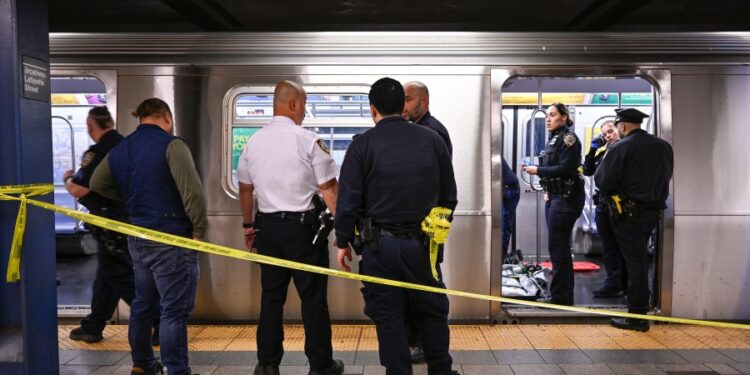(NewsNation) — The judge in the Daniel Penny trial dismissed a manslaughter charge against the former Marine on Friday afternoon.
The judge accepted the motion to dismiss the first count against Penny before sending the jury home for the weekend. They are scheduled to return Monday morning to deliberate on the second count.
“What I’m gonna do is this, manslaughter in second degree is dismissed, you are now free to consider count 2. Whether that makes any difference, I have no idea, but I direct you to focus deliberations on count 2. Render a verdict on that one,” he said.
Penny has pleaded not guilty to manslaughter and criminally negligent homicide charges in the death of Jordan Neely, a 30-year-old experiencing homelessness. Penny placed Neely in a chokehold for nearly six minutes after the man threatened to kill other passengers on the subway.
The jury, made up of five men and seven women, deliberated after closing arguments in the trial began Monday. Defense attorneys representing Penny petitioned a judge last week to have the charges against their client dismissed, but the judge ruled that the case would move to closing arguments.
The defense rested earlier Friday after electing not to have Penny testify in his own defense.
Deliberations began after the seven-week trial that included 40 witnesses. Jury members also watched hours of video during the trial and listened to recordings of 911 calls that were placed following the incident.
During their deliberations, the jury sent a series of notes to the judge, requesting key pieces of evidence, including cell phone video footage of Penny keeping the chokehold on Neely. The jury also requested that the judge read definitions of “recklessness” and “negligence”, which spoke to the issue of Penny’s justification for his actions.
Jordan Neely’s cause of death is disputed
Central to the case was whether the hold that Penny put on Neely led to the man’s death.
The medical examiner, key to the prosecution, said the reason for Neely’s death was the chokehold, but the defense’s experts said this was not the case. He said it was a combination of four factors: restraint and struggle, sickle cell crisis, a synthetic drug in his system called K-2 and schizophrenia.
Penny told officers in an interview room that Neely told passengers on the subway, “I’m gonna kill everybody. I’m gonna go to prison forever. I don’t care. I’m gonna do this.”

The defense’s clinical pathologist, Dr. Satish Chundru, testified that Neely’s injuries sustained in the 2023 incident, along with video shot by passengers, did not indicate that Neely died from the chokehold applied by Penny.
Chundru, citing medical records, testified that the location and extent of the bruising Neely sustained, along with other factors, led him to conclude that the chokehold was not fatal. In addition to the bruising on Neely’s neck, Chundru testified that there was a small amount of petechiae — small red spots caused by subsurface bleeding — on his eyelids.
Chundru concluded that Neely died from “the combined effects” of synthetic marijuana, schizophrenia, his struggle and restraint and a blood condition that can lead to fatal complications during exertion.
Prosecutors maintained that Penny’s actions are directly connected to Neely’s death.
“I’m sure that you had absolutely no question in your mind about what caused Jordan Neely’s death. It’s too obvious,” Yoran said during her closing argument.
“This is a clear case of death by chokehold.”
Daniel Penny encounters Jordan Neely
Jurors learned during the trial that Neely was begging for money on May 1, 2023, but that he began to shout to passengers that he was willing to die or go to jail.

Testimony included that Neely, who sometimes entertained passengers as an Elvis impersonator aboard the subway, began acting erratically and began making threats to passengers, witnesses said. Penny has said Neely lurched toward a woman with a small child and said, “I will kill.”
Penny put his arm around Neely’s neck, took him to the floor, and held Neely there, with Penny’s legs around him, for close to six minutes, bystander videos show. Neely had stopped moving at roughly the last minute, witnesses said.
Penny’s defense attorneys asked jury members to put themselves in the shoes of those aboard the train, while prosecutors countered that Penny acted too aggressively and was forceful and reckless in responding to Penny. Defense attorney Steven Raiser told jurors during his closing argument that Neely was filled with rage when he entered the train and was not afraid of any consequences.
However, prosecutors argued that despite Neely’s actions, Penny went too far.
“You obviously cannot kill someone because they are crazy and ranting and looking menacing, no matter what it is that they are saying,” Manhattan Assistant District Attorney Dafna Yoran told jurors during her closing argument, according to The Associated Press.
Raiser told jurors this week that his client could not release Neely from the hold without putting others in danger. He also said that Penny never applied enough pressure to Neely to cause his death.
Prosecutors disagreed, citing Penny’s military experience.
“He was trained in this,” Yoran said during her closing argument, referring to the chokehold, according to The New York Times, “and yet he continued with the foreseeable and tragic results.”
The Associated Press contributed reporting to this article.







